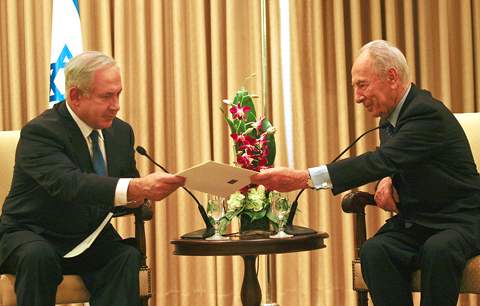Hawkish Likud leader Benjamin Netanyahu was tasked on Friday with forming a new Israeli government, fueling concerns that a right-wing coalition could torpedo the Middle East peace process.
Accepting the nomination from Israeli President Shimon Peres, the former prime minister named Iran as the main threat to Israel’s existence and made no direct reference to peace talks with the Palestinians.
Netanyahu is pushing for a broad coalition, evidently keen to avert a repeat of the situation in 1999, when his government collapsed following the defection of far-right parties that accused him of making concessions to Palestinians.

PHOTO: AP
Outgoing Foreign Minister Tzipi Livni emerged from talks with Peres saying she would have nothing to do with a right-wing coalition.
Livni said: “I will not be a pawn in a government that would be against our ideals.”
Israel needs “a government based on a two-state solution” for Palestinians and Israel, Livni said.
But Netanyahu did not give up on his hopes and invited Livni for talks today.
“I turn to the Kadima and Labour leaders: Let us close ranks and act together,” he said. “I want to meet you first and discuss the formation of a broad government coalition.”
Netanyahu did not directly mention Israeli-Palestinian peace talks and made no mention of the US-backed two-state solution, focusing instead on what he said was the threat from Iran.
“Iran is seeking to obtain a nuclear weapon and constitutes the gravest threat to our existence since the war of independence,” he said. “The responsibility we face is to achieve security for our country, peace with our neighbors and unity among us.”
Reacting to the nomination, the Palestinian Authority said it would only deal with the new Israeli government if it is committed to the peace process.
“We will not deal with the Israeli government unless it accepts a two-state solution and accepts to halt settlements and to respect past accords,” Palestinian President Mahmoud Abbas’ spokesman Nabil Abu Rudeina said.

WAITING GAME: The US has so far only offered a ‘best rate tariff,’ which officials assume is about 15 percent, the same as Japan, a person familiar with the matter said Taiwan and the US have completed “technical consultations” regarding tariffs and a finalized rate is expected to be released soon, Executive Yuan spokeswoman Michelle Lee (李慧芝) told a news conference yesterday, as a 90-day pause on US President Donald Trump’s “reciprocal” tariffs is set to expire today. The two countries have reached a “certain degree of consensus” on issues such as tariffs, nontariff trade barriers, trade facilitation, supply chain resilience and economic security, Lee said. They also discussed opportunities for cooperation, investment and procurement, she said. A joint statement is still being negotiated and would be released once the US government has made

Authorities have detained three former Taiwan Semiconductor Manufacturing Co (TMSC, 台積電) employees on suspicion of compromising classified technology used in making 2-nanometer chips, the Taiwan High Prosecutors’ Office said yesterday. Prosecutors are holding a former TSMC engineer surnamed Chen (陳) and two recently sacked TSMC engineers, including one person surnamed Wu (吳) in detention with restricted communication, following an investigation launched on July 25, a statement said. The announcement came a day after Nikkei Asia reported on the technology theft in an exclusive story, saying TSMC had fired two workers for contravening data rules on advanced chipmaking technology. Two-nanometer wafers are the most

NEW GEAR: On top of the new Tien Kung IV air defense missiles, the military is expected to place orders for a new combat vehicle next year for delivery in 2028 Mass production of Tien Kung IV (Sky Bow IV) missiles is expected to start next year, with plans to order 122 pods, the Ministry of National Defense’s (MND) latest list of regulated military material showed. The document said that the armed forces would obtain 46 pods of the air defense missiles next year and 76 pods the year after that. The Tien Kung IV is designed to intercept cruise missiles and ballistic missiles to an altitude of 70km, compared with the 60km maximum altitude achieved by the Missile Segment Enhancement variant of PAC-3 systems. A defense source said yesterday that the number of

Taiwanese exports to the US are to be subject to a 20 percent tariff starting on Thursday next week, according to an executive order signed by US President Donald Trump yesterday. The 20 percent levy was the same as the tariffs imposed on Vietnam, Sri Lanka and Bangladesh by Trump. It was higher than the tariffs imposed on Japan, South Korea and the EU (15 percent), as well as those on the Philippines (19 percent). A Taiwan official with knowledge of the matter said it is a "phased" tariff rate, and negotiations would continue. "Once negotiations conclude, Taiwan will obtain a better